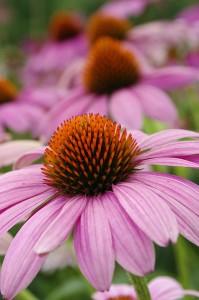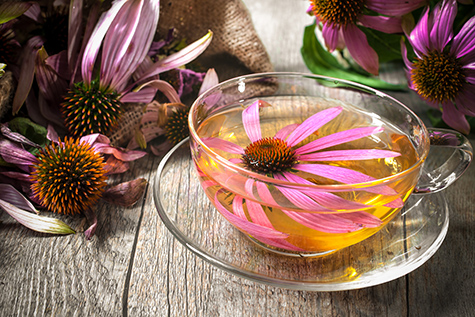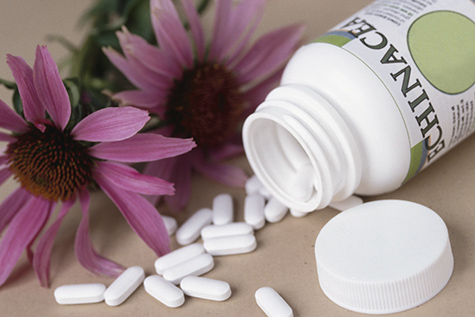Can Echinacea Fight Colds, Flu and More?

You’re coming down with that tickle in your throat and a bit of fatigue – possibly getting a
cold. As viruses like the flu rage on this winter, do you reach for the herb echinacea to help boost the immune system at the first sign of trouble? If so, you’re not alone. A perennial flowering plant related to sunflowers, daisies and ragweed, echinacea is native to the Rocky Mountains in the U.S.
It was originally discovered and used by Native Americans who passed it along to early settlers and its medicinal uses were then taken back to Europe. It is taken as an herb that stokes the immune system to ward off the common cold and influenza. Echinacea also can be used topically and there is some convincing evidence that it may work.
Orally, echinacea supplements are used to:
- Prevent the common cold, influenza, ear infections and respiratory infections
- Boost the immune system
- Prevent urinary tract infections, yeast infections and the herpes virus
- Support chronic fatigue syndrome
- Calm anxiety
- Boost exercise performance
- Reduce migraine symptoms
Echinacea comes in a variety of preparations in supplement form; liquid extracts and powders are common. Dosages range widely, making it difficult to interpret the correct dosing to use. Studies themselves on echinacea on the common cold are promising but also conflicting. The variety of plant species, preparations, plant parts and doses used all contribute to the confusion. There are some studies that show a 5ml extract twice daily for 10 days reduced the duration of a cold to 6 days (compared to 9 with the placebo).
There are other studies that show taking echinacea does not reduce the duration or severity of colds when compared to a placebo. There is some evidence that taking echinacea daily may help prevent colds from happening, possibly because it boosts the immune system. In this way, it may be helpful in fighting other viruses like herpes simplex or the human papilloma virus (HPV), though more research is needed in these areas.
Though there are some studies observing the possible use of echinacea for anxiety or for exercise performance, they are not yet conclusive. Studies on exercise performance specifically have used very large doses – 2 grams four times daily. There is some confusion in studies about the actual active parts of echinacea; some people use above ground preparations like the stalk or flower while others utilize the root.
What You Need To Know
 The good news is that echinacea is generally well tolerated in studies. Stomach upset including nausea and vomiting, abdominal pain, heartburn, diarrhea and constipation and skin rashes are the most common side effects. Keep in mind that, because it is related to ragweed, those with allergies should be very cautious before considering use as a reaction could likely occur. If considering using an herb like echinacea to prevent or treat viruses like the common cold or flu, make sure to speak to your doctor first because it does interact with some common drugs and medications including caffeine, immunosuppressants, and cytochrome P450 substrates including acetaminophen (Tylenol), ondansetron (Zofran), warfarin (Coumadin).
The good news is that echinacea is generally well tolerated in studies. Stomach upset including nausea and vomiting, abdominal pain, heartburn, diarrhea and constipation and skin rashes are the most common side effects. Keep in mind that, because it is related to ragweed, those with allergies should be very cautious before considering use as a reaction could likely occur. If considering using an herb like echinacea to prevent or treat viruses like the common cold or flu, make sure to speak to your doctor first because it does interact with some common drugs and medications including caffeine, immunosuppressants, and cytochrome P450 substrates including acetaminophen (Tylenol), ondansetron (Zofran), warfarin (Coumadin).
What is your experience with echinacea? Let us know about your successes or challenges in the comments!
Resources:
Natural Medicines Database. Echinacea. https://naturalmedicines.therapeuticresearch.com/databases/food,-herbs-supplements/professional.aspx?productid=981. Updated 12/12/17. Accessed 1/27/18.
Schulten B, Bulitta M, Ballering-Bruhl B, et al. Efficiency of Echinacea purpurea in patients with a common cold. A placebo-controlled, randomized, double-blind clinical trial. Arzneimittelforschun. 2001;51:563-8.
Shah SA, Sander S, White CM, et al. Evaluation of echinacea for the prevention and treatment of the common cold: a meta-analysis. Lancet Infect Dis 2007;7:473-80.
Whitehead MT, Martin TD, Scheett TP, et al. Running economy and maximal oxygen consumption after 4 weeks of oral Echinacea supplementation. J Strength Cond Res 2012;26:1928-33.

